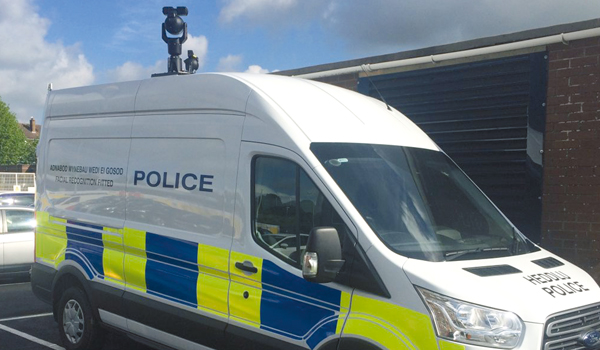South Wales Police defends use of facial recognition technology in landmark legal challenge
Lawyers representing South Wales Police in a legal challenge against its use of facial recognition technology have argued that the use of such systems does not interfere with human rights and is no different to the use of CCTV cameras.
Office worker Ed Bridges, 36, from Cardiff, crowdfunded the legal action claiming his face was scanned while Christmas shopping in 2017 and again at a peaceful anti-arms protest in 2018. He said this breached his human rights and the Data Protection Act. The case is currently being heard at the Administrative Court in Cardiff.
Jeremy Johnson QC, representing South Wales Police , said the force’s use was justified as it deterred people from carrying out crime, is similar to police use of CCTV, and information of a person’s face is not stored unless police already have the image of a known individual in their ‘watch list’ – a list of known offenders, those suspected of offending, and persons of interest.
Mr Johnson told the court on Wednesday (May 22): “Automatic facial recognition (AFR) is a further technology that potentially has great utility for the prevention of crime, the apprehension of offenders, and the protection of the public. If AFR has a deterrent effect, then it achieves its purpose. It offers significant value to the public and to public interest.
“The extractions of information of the images is nothing more than a person looking at two photographs and comparing them. So far as an individual is concerned there is no difference in principle knowing you’re on CCTV and someone looking at it or that is being done automatically in a millisecond. There is no continuing effect on the individual. It is deleted 24 hours later presuming there is no match. No human operator sees any of it.”
Mr Johnson said the two deployments of AFR where Mr Bridges claims his face was scanned were “justified” and resulted in police successfully identifying three people.
“No personal information relating to the complainant was shared with any police officer. He was not spoken to by any police officer. The practical impact on him was limited,” he said.
“On each occasion AFR was being operated in an entirely transparent way and there has been no complaint apart from in these proceedings. Operation Fulcrum led to two arrests. The demonstration deployment identified a person who had made bomb threats at the very same event the previous year and subjected to a custodial sentence.
“It is of obvious value to policing to know that person is there so if another bomb threat is made you can deal with it accordingly, but it did not interfere with the complainant’s rights or anyone else there.”
The case continues.






